For All My Fellow Oversharers Out There.
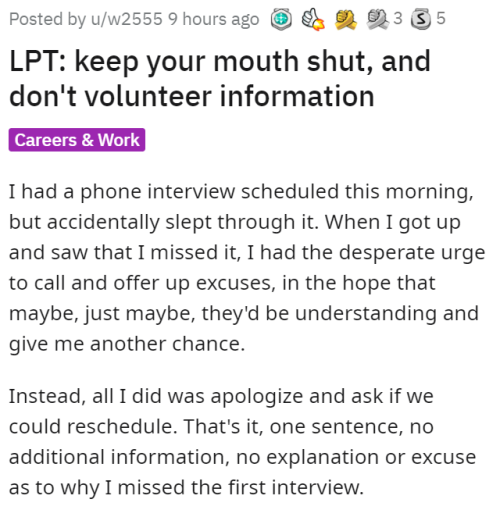
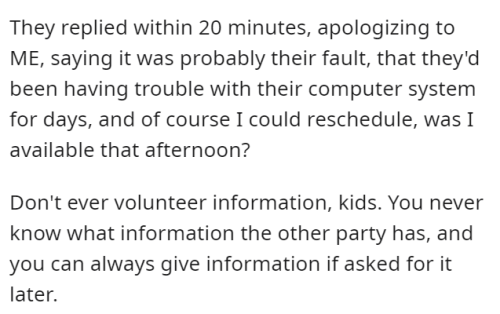
For all my fellow oversharers out there.
More Posts from Darthvoxpo and Others
A sudden, terrifying thought
When you see an animal with its eyes set to the front, like wolves, or humans, that’s usually a predator animal.

If you see an animal with its eyes set farther back, though—to the side—that animal is prey.

Now look at this dragon.
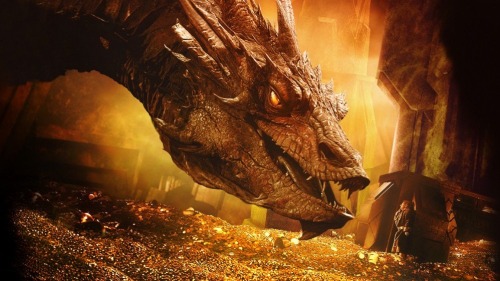
See those eyes?
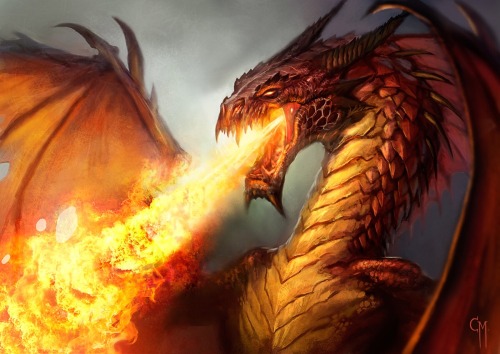
They’re to the SIDE.
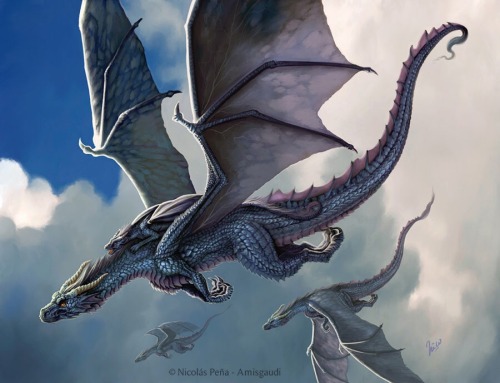
This raises an interesting—and terrifying—question.
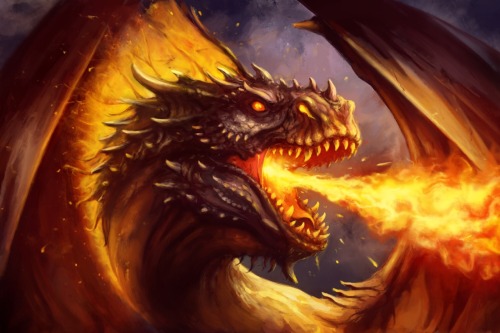
What in the name of Lovecraft led evolution to consider DRAGONS…
As PREY?
How To Tell If A RWBY Character Is Sharing Their Body With Another Soul
Their reflection fails to reverse when the other soul is talking.
Remember Volume 4? Oscar notices something wrong with himself in the mirror just before Ozpin makes himself known.
Here's Oscar initially looking in the mirror, and not seeing anything wrong:

And here's the exact next shot, directly before Ozpin speaks:

Notice how the pockets on his arm and chest fail to switch sides, to be a reverse image like mirrors project, in the second image, but not the first.
Okay, maybe it was a goof in that second shot. It doesn't prove anything.
Here's some images from The Lost Fable with properly reversed reflections:


And now here's Ozma 2.0, just before and during his host asking him what they're doing:


Notice his lock of hair has failed to reverse in the reflection. It's swept towards his left-hand side in both.
Now, this is not foolproof. Not reversing a reflection is a very simple animation mistake to make, as we can see in Volume 7 Chapter 3:
Though, admittedly, Blake is metaphorically a person with two souls. Beauty and Beast in one person, symbolising the struggle between who she is and the person Adam wanted her to be. So maybe it's not a mistake? After all, she is the person who introduces us to the concept of people with two souls...

So, anyway, why do I bring this up?
Well, a lot of people have been discussing Cinder looking sad in her reflection in this week's episode:
Only, as a post by @witch-of-the-world has pointed out, her reflection has failed to reverse.

Now, this could easily be an animation mistake. Place a transparent model of Cinder behind the glass, fail to reverse-image it, easy mistake to make.
And, I mean, where would Cinder even get a second soul from? It's not like anyone was merging souls with the Fall Maiden powers just as Amber died-
Oh.
Both Salem's forces and even Lionheart have repeatedly said that that Ozpin's reincarnation this time around has been much faster than usual. The process usually takes longer.
So, to answer the question, why does Cinder look sad in her reflection?
And we're what? A year out from the Fall of Beacon, as opposed to Oscar's six months?
And there's just... little things that have left me and others suspicious. Her use of spears at the Attack on Haven, knowing that hurting Weiss would hurt Jaune, bringing up the Destiny line out of nowhere in Volume 6, the sheer amount of parallels between Ozma and Pyrrha (even using the same effect for their final deaths), the fact that Cinder's outfit looks kinda inspired by Pyrrha's...
So, to answer the question, why does Cinder look sad in her reflection?
I think there's a small chance that it wasn't Cinder in that reflection.







H.G. from The New York Times comment section:
“I saw this. In Detroit, a lot of folks who would normally support Hillary, were passing around inflammatory memes of BLM, the incarceration rate under Bill, and a lot of anti-Hillary invictives. It spread like wildfire on fb. Conversations sprouted about the Dems taking the black, inner city vote for granted and branched into Native American/Black eradication, Bill’s “black love child”, even anti-vax - the memes got louder and more outrageous and arguments broke out. Folks talked about writing in for Bernie or Jill Stein. I was stunned because Detroit has always been a place where the Dem message was clear; the was a black slate, union slate…issues were discussed…the church ladies voted and plenty of folks followed suit. This was totally upended.
And in the end - 70,000 less Detroiters showed up for Hill than for Obama - in a state Trump won by 10,704 votes.”
——–
USA Today:
“Russia’s Internet Research Agency “launched an extended attack on the United States by using computational propaganda.” More than 30 million people shared content from the Internet Research Agency on Facebook and Instagram from 2015 to 2017.
The Internet Research Agency operated a “troll farm” based in Russian President Vladimir Putin’s hometown that employed hundreds of English speakers with “a strategic goal to sow discord in the U.S. political system, including … supporting the presidential campaign of then-candidate Donald J. Trump and disparaging Hillary Clinton,” according to the indictment.
The Oxford report says the Russian trolls’ efforts focused on a few main objectives: pushing African-American voters to boycott the election and giving them misinformation about how to vote; getting Latino voters to distrust the U.S. government; “encouraging extreme right-wing voters to be more confrontational”; and spreading false stories and conspiracy theories.
Efforts targeting African-Americans, Latinos, liberals and members of the LGBTQ community used different approaches with each group, but the overall aim was to get voters “to boycott the election, abstain from voting for Clinton, or to spread cynicism about participating in the election in general.”
“Differential messaging to each of these target groups was designed to push and pull them in different ways. What is clear is that all of the messaging clearly sought to benefit the Republican Party – and specifically, Donald Trump,” the Oxford report says.
The Russian campaign used a range of platforms, including Facebook, Twitter, Tumblr, Instagram, YouTube, Pinterest, Vine, Gab, Meetup, Reddit, Medium, Pokemon Go and Google+, according to the reports.
New Knowledge says the “scale of their operation was unprecedented,” reaching “126 million people on Facebook, at least 20 million users on Instagram, 1.4 million users on Twitter, and uploaded over 1,000 videos to YouTube.”
The report says there was a “clear bias” toward Trump in the operations. The agency posted no pro-Clinton content on Instagram or Facebook, except for one post encouraging Muslims to attend a rally supporting her.”
——–
The New York Times #1:
“The report says the “most prolific” efforts on Facebook and Instagram focused on African-Americans as the Russians developed unwitting “human assets” to help them share their content.
Of 81 Facebook pages created by the Internet Research Agency in the Senate’s data, 30 targeted African-American audiences, amassing 1.2 million followers, the report finds. By comparison, 25 pages targeted the political right and drew 1.4 million followers. Just seven pages focused on the political left, drawing 689,045 followers.
While the right-wing pages promoted Mr. Trump’s candidacy, the left-wing pages scorned Mrs. Clinton while promoting Senator Bernie Sanders of Vermont and Jill Stein, the Green Party candidate. The voter suppression effort was focused particularly on Sanders supporters and African-Americans, urging them to shun Mrs. Clinton in the general election and either vote for Ms. Stein or stay home.
Whether such efforts had a significant effect is difficult to judge. Black voter turnout declined in 2016 for the first time in 20 years in a presidential election, but it is impossible to determine whether that was the result of the Russian campaign.
The New Knowledge report argues that the Internet Research Agency’s presence on Instagram has been underestimated and may have been as effective or more effective than its Facebook effort. The report says there were 187 million engagements on Instagram — users “liking” or sharing the content created in Russia — compared with 76.5 million engagements on Facebook.
The New Knowledge report finds that while “other distinct ethnic and religious groups were the focus of one or two Facebook pages or Instagram accounts, the black community was targeted extensively with dozens.
”Facebook ads were targeted at users who had shown interest in black history, the Black Panther Party and Malcolm X. The most popular of the Russian Instagram accounts was @blackstagram, with 303,663 followers.
After the election, the report says, the Internet Research Agency put up some 70 posts on Facebook and Instagram that mocked the claims that Russia had interfered in the election.
“You’ve lost and don’t know what to do?” said one such post. “Just blame it on Russian hackers.”
——–
The New York Times #2:
“To a degree not fully appreciated, the Russian operation relentlessly targeted African-Americans.
On YouTube, the Russians played on police shootings of unarmed black men with channels with names like “Don’t Shoot” and “BlackToLive.”
While most media attention has focused on Facebook pages appealing to the political right, the Russian effort aimed at black Americans was actually larger, reaching almost as many people. Of 81 Facebook pages created by the Internet Research Agency, 30 targeted African-American audiences, amassing 1.2 million followers, the report finds. By comparison, 25 pages targeted the political right and drew 1.4 million followers.
One clear Russian goal, pursued on multiple fronts, was to suppress Democratic turnout in 2016.
One strand focused, once again, on African-American voters. “These campaigns pushed a message that the best way to advance the cause of the African-American community was to boycott the election,” the Oxford report says. One bogus post declared: “HILLARY RECEIVED $20,000 DONATION FROM KKK TOWARDS HER CAMPAIGN.”
The Russian accounts urged people who had backed Bernie Sanders against Hillary Clinton for the Democratic presidential nomination to stay home or to vote for Jill Stein, the Green Party candidate, in the general election. The New Knowledge report also describes what it calls “malicious misdirection” and “tweets designed to create confusion about voting rules.”
All of the emphasis on Facebook has obscured the huge role of Instagram, as well as the Russian activity on many smaller platforms.
Most of the early media coverage of the Russian campaign focused on Facebook. The New Knowledge report argues that the Internet Research Agency’s presence on Instagram, which is owned by Facebook, has been underestimated and may have been as effective or even more effective than its Facebook effort. The report says there were 187 million engagements on Instagram — users “liking” or sharing the content created in Russia — compared with 76.5 million engagements on Facebook.
Both reports note that there was hardly a social platform, however obscure, that the Internet Research Agency did not invade: Reddit, Google+, Vine, Gab, Meetup, Pinterest, Tumblr and more. The Russian trolls even created a podcast on SoundCloud.”
——–
Ever wonder why so many videos were circulating online showing Hillary’s past comments being against gay marriage?
Answer: Russian bots trying to suppress her vote with the LGBT community.
Hillary helped increase funding for HIV/AIDS research and medicine as First Lady. She was the first First Lady to march on a gay pride parade. As a two-time New York Senator, Hillary fought for stronger LGBT hate crime laws and gay adoption rights. As Secretary of State, Hillary passed the first-ever United Nations resolution on gay rights (declaring: “gay rights are human rights and human rights are gay rights”), began the Global Equity Fund, and made it so trans Americans could change the gender on their passports.
But let’s vilify the woman for evolving on gay marriage (just like Obama, Biden, and Bernie did).
If you are gay and voted against Hillary due to her being against gay marriage at one point in time (just like her male counterparts), you were fooled by Russian bots.
Furthermore, Hillary received nearly 4 million more votes than Bernie Sanders during the Democratic primary.

The DNC didn’t rig the voting machines.
But that didn’t stop Russian bots from spreading the myth that the DNC stole the primary for Hillary, and that voting for Jill Stein wouldn’t be a “wasted” vote.
Russian bots manipulated Bernie supporters into thinking his nomination was stolen, therefore making it easy to convince them to either not vote or vote for Jill Stein.
Let us also remember that at the Children’s Defense Fund, Hillary investigated African American juveniles being placed in South Carolina adult prisons. Hillary also went door-to-door to expose school segregation in the south. Yet because of Bill Clinton’s 3-strikes policy (that was voted for by Bernie Sanders and supported by the black caucus at the time), Russian bots were able to manipulate African American voters against Hillary.
In 2020, please don’t be fooled by Russian bots and please vote for the Democratic nominee – no matter who he or she is. Clearly, every vote counts.
here’s a story about changelings
reposted from my old blog, which got deleted: Mary was a beautiful baby, sweet and affectionate, but by the time she’s three she’s turned difficult and strange, with fey moods and a stubborn mouth that screams and bites but never says mama. But her mother’s well-used to hard work with little thanks, and when the village gossips wag their tongues she just shrugs, and pulls her difficult child away from their precious, perfect blossoms, before the bites draw blood. Mary’s mother doesn’t drown her in a bucket of saltwater, and she doesn’t take up the silver knife the wife of the village priest leaves out for her one Sunday brunch. She gives her daughter yarn, instead, and instead of a rowan stake through her inhuman heart she gives her a child’s first loom, oak and ash. She lets her vicious, uncooperative fairy daughter entertain herself with games of her own devising, in as much peace and comfort as either of them can manage. Mary grows up strangely, as a strange child would, learning everything in all the wrong order, and biting a great deal more than she should. But she also learns to weave, and takes to it with a grand passion. Soon enough she knows more than her mother–which isn’t all that much–and is striking out into unknown territory, turning out odd new knots and weaves, patterns as complex as spiderwebs and spellrings. “Aren’t you clever,” her mother says, of her work, and leaves her to her wool and flax and whatnot. Mary’s not biting anymore, and she smiles more than she frowns, and that’s about as much, her mother figures, as anyone should hope for from their child. Mary still cries sometimes, when the other girls reject her for her strange graces, her odd slow way of talking, her restless reaching fluttering hands that have learned to spin but never to settle. The other girls call her freak, witchblood, hobgoblin. “I don’t remember girls being quite so stupid when I was that age,” her mother says, brushing Mary’s hair smooth and steady like they’ve both learned to enjoy, smooth as a skein of silk. “Time was, you knew not to insult anyone you might need to flatter later. ‘Specially when you don’t know if they’re going to grow wings or horns or whatnot. Serve ‘em all right if you ever figure out curses.” “I want to go back,” Mary says. “I want to go home, to where I came from, where there’s people like me. If I’m a fairy’s child I should be in fairyland, and no one would call me a freak.” “Aye, well, I’d miss you though,” her mother says. “And I expect there’s stupid folk everywhere, even in fairyland. Cruel folk, too. You just have to make the best of things where you are, being my child instead.” Mary learns to read well enough, in between the weaving, especially when her mother tracks down the traveling booktraders and comes home with slim, precious manuals on dyes and stains and mordants, on pigments and patterns, diagrams too arcane for her own eyes but which make her daughter’s eyes shine. “We need an herb garden,” her daughter says, hands busy, flipping from page to page, pulling on her hair, twisting in her skirt, itching for a project. “Yarrow, and madder, and woad and weld…” “Well, start digging,” her mother says. “Won’t do you a harm to get out of the house now’n then.” Mary doesn’t like dirt but she’s learned determination well enough from her mother. She digs and digs, and plants what she’s given, and the first year doesn’t turn out so well but the second’s better, and by the third a cauldron’s always simmering something over the fire, and Mary’s taking in orders from girls five years older or more, turning out vivid bolts and spools and skeins of red and gold and blue, restless fingers dancing like they’ve summoned down the rainbow. Her mother figures she probably has. “Just as well you never got the hang of curses,” she says, admiring her bright new skirts. “I like this sort of trick a lot better.” Mary smiles, rocking back and forth on her heels, fingers already fluttering to find the next project. She finally grows up tall and fair, if a bit stooped and squinty, and time and age seem to calm her unhappy mouth about as well as it does for human children. Word gets around she never lies or breaks a bargain, and if the first seems odd for a fairy’s child then the second one seems fit enough. The undyed stacks of taken orders grow taller, the dyed lots of filled orders grow brighter, the loom in the corner for Mary’s own creations grows stranger and more complex. Mary’s hands callus just like her mother’s, become as strong and tough and smooth as the oak and ash of her needles and frames, though they never fall still. “Do you ever wonder what your real daughter would be like?” the priest’s wife asks, once. Mary’s mother snorts. “She wouldn’t be worth a damn at weaving,” she says. “Lord knows I never was. No, I’ll keep what I’ve been given and thank the givers kindly. It was a fair enough trade for me. Good day, ma’am.” Mary brings her mother sweet chamomile tea, that night, and a warm shawl in all the colors of a garden, and a hairbrush. In the morning, the priest’s son comes round, with payment for his mother’s pretty new dress and a shy smile just for Mary. He thinks her hair is nice, and her hands are even nicer, vibrant in their strength and skill and endless motion. They all live happily ever after. * Here’s another story: Gregor grew fast, even for a boy, grew tall and big and healthy and began shoving his older siblings around early. He was blunt and strange and flew into rages over odd things, over the taste of his porridge or the scratch of his shirt, over the sound of rain hammering on the roof, over being touched when he didn’t expect it and sometimes even when he did. He never wore shoes if he could help it and he could tell you the number of nails in the floorboards without looking, and his favorite thing was to sit in the pantry and run his hands through the bags of dry barley and corn and oat. Considering as how he had fists like a young ox by the time he was five, his family left him to it. “He’s a changeling,” his father said to his wife, expecting an argument, but men are often the last to know anything about their children, and his wife only shrugged and nodded, like the matter was already settled, and that was that. They didn’t bind Gregor in iron and leave him in the woods for his own kind to take back. They didn’t dig him a grave and load him into it early. They worked out what made Gregor angry, in much the same way they figured out the personal constellations of emotion for each of their other sons, and when spring came, Gregor’s father taught him about sprouts, and when autumn came, Gregor’s father taught him about sheaves. Meanwhile his mother didn’t mind his quiet company around the house, the way he always knew where she’d left the kettle, or the mending, because she was forgetful and he never missed a detail. “Pity you’re not a girl, you’d never drop a stitch of knitting,” she tells Gregor, in the winter, watching him shell peas. His brothers wrestle and yell before the hearth fire, but her fairy child just works quietly, turning peas by their threes and fours into the bowl. “You know exactly how many you’ve got there, don’t you?” she says. “Six hundred and thirteen,” he says, in his quiet, precise way. His mother says “Very good,” and never says Pity you’re not human. He smiles just like one, if not for quite the same reasons. The next autumn he’s seven, a lucky number that pleases him immensely, and his father takes him along to the mill with the grain. “What you got there?” The miller asks them. “Sixty measures of Prince barley, thirty two measures of Hare’s Ear corn, and eighteen of Abernathy Blue Slate oats,” Gregor says. “Total weight is three hundred fifty pounds, or near enough. Our horse is named Madam. The wagon doesn’t have a name. I’m Gregor.” “My son,” his father says. “The changeling one.” “Bit sharper’n your others, ain’t he?” the miller says, and his father laughs. Gregor feels proud and excited and shy, and it dries up all his words, sticks them in his throat. The mill is overwhelming, but the miller is kind, and tells him the name of each and every part when he points at it, and the names of all the grain in all the bags waiting for him to get to them. “Didn’t know the fair folk were much for machinery,” the miller says. Gregor shrugs. “I like seeds,” he says, each word shelled out with careful concentration. “And names. And numbers.” “Aye, well. Suppose that’d do it. Want t’help me load up the grist?” They leave the grain with the miller, who tells Gregor’s father to bring him back ‘round when he comes to pick up the cornflour and cracked barley and rolled oats. Gregor falls asleep in the nameless wagon on the way back, and when he wakes up he goes right back to the pantry, where the rest of the seeds are left, and he runs his hands through the shifting, soothing textures and thinks about turning wheels, about windspeed and counterweights. When he’s twelve–another lucky number–he goes to live in the mill with the miller, and he never leaves, and he lives happily ever after. * Here’s another: James is a small boy who likes animals much more than people, which doesn’t bother his parents overmuch, as someone needs to watch the sheep and make the sheepdogs mind. James learns the whistles and calls along with the lambs and puppies, and by the time he’s six he’s out all day, tending to the flock. His dad gives him a knife and his mom gives him a knapsack, and the sheepdogs give him doggy kisses and the sheep don’t give him too much trouble, considering. “It’s not right for a boy to have so few complaints,” his mother says, once, when he’s about eight. “Probably ain’t right for his parents to have so few complaints about their boy, neither,” his dad says. That’s about the end of it. James’ parents aren’t very talkative, either. They live the routines of a farm, up at dawn and down by dusk, clucking softly to the chickens and calling harshly to the goats, and James grows up slow but happy. When James is eleven, he’s sent to school, because he’s going to be a man and a man should know his numbers. He gets in fights for the first time in his life, unused to peers with two legs and loud mouths and quick fists. He doesn’t like the feel of slate and chalk against his fingers, or the harsh bite of a wooden bench against his legs. He doesn’t like the rules: rules for math, rules for meals, rules for sitting down and speaking when you’re spoken to and wearing shoes all day and sitting under a low ceiling in a crowded room with no sheep or sheepdogs. Not even a puppy. But his teacher is a good woman, patient and experienced, and James isn’t the first miserable, rocking, kicking, crying lost lamb ever handed into her care. She herds the other boys away from him, when she can, and lets him sit in the corner by the door, and have a soft rag to hold his slate and chalk with, so they don’t gnaw so dryly at his fingers. James learns his numbers well enough, eventually, but he also learns with the abruptness of any lamb taking their first few steps–tottering straight into a gallop–to read. Familiar with the sort of things a strange boy needs to know, his teacher gives him myths and legends and fairytales, and steps back. James reads about Arthur and Morgana, about Hercules and Odysseus, about djinni and banshee and brownies and bargains and quests and how sometimes, something that looks human is left to try and stumble along in the humans’ world, step by uncertain step, as best they can. James never comes to enjoy writing. He learns to talk, instead, full tilt, a leaping joyous gambol, and after a time no one wants to hit him anymore. The other boys sit next to him, instead, with their mouths closed, and their hands quiet on their knees. “Let’s hear from James,” the men at the alehouse say, years later, when he’s become a man who still spends more time with sheep than anyone else, but who always comes back into town with something grand waiting for his friends on his tongue. “What’ve you got for us tonight, eh?” James finishes his pint, and stands up, and says, “Here’s a story about changelings.”
and speaking of Detritus’ character development:
throughout the books Detritus is shown as more and more smart, I mean compare the one in Guards! Guards! with the one from Thud! the difference is staggering.
now, this can be attributed to two things:
1) Cuddy’s helmet, which isn’t mentioned after Jingo, i think, but this can just be taken to mean that it just became normal, like the Librarian being an ape, no one notices it any more, but given the fact that the narrative mentions how bothered Detritus is by heat, and makes no mention of the helmet, i don’t think that’s it*, or
2) shockingly, when you take a member of a vilified, exploited social group (’you were chained to a wall like a guard dog when i first met you’, said Vimes, and ‘I had the stables cleaned out for your trolls’, said Bonnie or Bobbie or whatever her name was) and put them in an encouraging, supportive, hell, i’d even say loving environment, and than proceed to treat them respect, openly, actively condemn discrimination against them, and trust them with authority, they actually raise to the task at hand and start showing what they’re actually capable of.
After all, Detritus, Mended Drum splatter, doesn’t really need to think much, and even if he did, what’s the point? Who cares what/if a troll thinks?
but Sergeant Detritus of the Ankh-Morpork City Watch? Head of the anti-drug unit? Leader of the troll youth programme? Most senior troll officer in the Watch? Well, there are so many people counting on him, people who value his opinion, he just needs to be smart, doesn’t he?
Also, when you take that into consideration, like, is it any wonder that he is so invested in that youth programme? That he is such a mother hen? After all, look what an opportunity did for him, and he’s hardly the sharpest knife in the drawer.**
*but like, it would have been nice if they remembered Cuddy existed at least once in a while, I mean Cheery is amazing, but you can have more than one of a species with a significant role in a book, also, i do think that Cuddy left a mark on Detritus that is absolutely never mentioned again, and that’s not right.
**another parallel Thud! makes between Vimes and him.
the ‘ooh NO brer fox, don’t give my post a bunch of notes, noOOo i would HATE that!’ style of clout fishing is so obnoxious. if you’re going to chase clout do it in an honest and god-fearing way. im holed up in a skyscraper and every ten minutes that go by without someone reblogging this post i shoot another hostage






Sorry for being absent for so long. Again. I faced with some health difficultis and they take all my time. Anyway This was an answer for our wh40k ask on vk. QUESTION TO HORUS: What did you feel when Malcador got you on your knees and started to strangle for saying your lost brother’s name? Humiliation? Did you like it or just wanted to kill the old man?
Star Trek Apoliticality Hall of Fame
1967 - “A Taste of Armageddon”: Captain Kirk introduces the technocratic elites of rival worlds to the full horrors of warfare. Totally apolitical.
1968 - “A Private Little War”: Superpowers fight a destructive proxy war on a jungle planet; aired during the Tet Offensive. No politics here.
1969 - “Let This Be Your Last Battlefield”: White-and-black guys oppress black-and-white guys until their planet is destroyed in a race war. Aired 9 months after Martin Luther King Jr. was assassinated. Politics-free.
1986 - “Star Trek IV: The Voyage Home”: In this apolitical adventure, the crew of the Enterprise travels back in time to the 20th century to rescue humpbacked whales from extinction at the hands of industrial over-fishing.
1987 - 1994 - “Star Trek: The Next Generation”: Set in a post-scarcity communist utopia in which profit motive is looked upon as barbarous. Debuted during the Reagan Administration. Just a mindless adventure series.
1991 - “Star Trek VI: The Undiscovered Country”: Two superpowers negotiate an end to their decades-long Cold War over the objections of reactionary factions in both countries. Aired 4 months after the attempted coup against Gorbachev and two weeks before the dissolution of the USSR. No politics here.
1992 - “The Outcast”: The Enterprise visits a planet with only one biological sex, where a character who nevertheless identifies as a woman is forced to undergo conversion therapy. Released at the height of the AIDS epidemic. Mercifully free of politics.
1993 - 1999 - “Star Trek: Deep Space Nine”: This politics-devoid series, which coincidentally aired during the Balkan Wars, follows a group of Federation observers who are assigned to guide the recovery of a war-torn planet.
1995 - “Past Tense, Parts 1 and 2″: Sisko, Bashir, and Dax take an apolitical trip back in time to an austerity- and inequality-ravaged early-twenty-first-century America on the cusp of revolutionary class violence, where despairing poor people are locked in ghettos whilst they “look for work”.
1996 - “Bar Association”: The employees of Quark’s Bar strike against exploitation by their employer; Rom literally quotes Karl Marx to his brother (in a wholly apolitical fashion).
2000 - “Critical Care”: The Doctor is abducted and forced to work in a horrifying, dystopian hospital where quality care and competent medics are reserved for the rich and well-to-do whilst the poor are left to bleed in an over-crowded, septic, dingy little room. Any resemblance to the American healthcare system is purely coincidental.
2001 - “Repentence”: Voyager finds itself needing to escort a bunch of alien deathrow prisoners to their execution, but finds that there is an entirely apolitical racial bias in who gets sentences in this fashion, and also that many of the murderers are not beyond reform.
2001: “Broken Bow”: Airing three weeks after 9/11, this apolitical episode finds Starfleet in conflict with a cabal of terrorists known as the Taliban Suliban.
2004: “The Forge”, “Awakening”, and “Kir’Shara”: A corrupt Vulcan government cracks down on pacifist dissidents and tries to instigate a war against with Andoria through bogus accusations that they are developing weapons of mass destruction. Aired in that lovely, politics-free aftermath of the US invasion of Iraq.
…Anyways, I could go on, but I think I’ve made my point: Star trek was always completely apolitical until Alex Kurtzman ruined it. If only they could return to the mindless, action-packed romp that Gene Roddenberry had always intended.

i like when ppl reblog posts “so&so just did this by taking adderall” and its usually an amazing or wild feat and i just gotta say, as someone with adhd. this is why my insurance doesnt cover adderall. this is why adderall is classified as a narcotic in my state. im glad yall are havin fun abusing meds i need to live. hope it was worth it.
-
 sevenseaways liked this · 2 weeks ago
sevenseaways liked this · 2 weeks ago -
 okiecomputerr liked this · 3 weeks ago
okiecomputerr liked this · 3 weeks ago -
 just-oogley-it reblogged this · 3 weeks ago
just-oogley-it reblogged this · 3 weeks ago -
 anotheraverageotaku liked this · 4 weeks ago
anotheraverageotaku liked this · 4 weeks ago -
 theveganwildflower reblogged this · 1 month ago
theveganwildflower reblogged this · 1 month ago -
 moonmacabre01 reblogged this · 1 month ago
moonmacabre01 reblogged this · 1 month ago -
 cyzyrynka reblogged this · 1 month ago
cyzyrynka reblogged this · 1 month ago -
 bladeangelx reblogged this · 1 month ago
bladeangelx reblogged this · 1 month ago -
 enshrined-sun-devil liked this · 1 month ago
enshrined-sun-devil liked this · 1 month ago -
 narutomaki reblogged this · 1 month ago
narutomaki reblogged this · 1 month ago -
 penceratepoetry reblogged this · 1 month ago
penceratepoetry reblogged this · 1 month ago -
 fandomplethora liked this · 2 months ago
fandomplethora liked this · 2 months ago -
 livefasttryingnottodieyoung liked this · 2 months ago
livefasttryingnottodieyoung liked this · 2 months ago -
 gruemoon reblogged this · 2 months ago
gruemoon reblogged this · 2 months ago -
 gruemoon liked this · 2 months ago
gruemoon liked this · 2 months ago -
 thejenlife reblogged this · 2 months ago
thejenlife reblogged this · 2 months ago -
 bladeangelx reblogged this · 2 months ago
bladeangelx reblogged this · 2 months ago -
 yoshifics reblogged this · 2 months ago
yoshifics reblogged this · 2 months ago -
 im-your-sweet-flower liked this · 2 months ago
im-your-sweet-flower liked this · 2 months ago -
 dandelionsinsunshine liked this · 2 months ago
dandelionsinsunshine liked this · 2 months ago -
 luxaii liked this · 2 months ago
luxaii liked this · 2 months ago -
 ahbaeth liked this · 2 months ago
ahbaeth liked this · 2 months ago -
 koltarmi reblogged this · 2 months ago
koltarmi reblogged this · 2 months ago -
 koltarmi liked this · 2 months ago
koltarmi liked this · 2 months ago -
 i-put-the-sin-in-sinclaire reblogged this · 2 months ago
i-put-the-sin-in-sinclaire reblogged this · 2 months ago -
 tudun-tun liked this · 2 months ago
tudun-tun liked this · 2 months ago -
 servungcint reblogged this · 2 months ago
servungcint reblogged this · 2 months ago -
 mikhzi liked this · 2 months ago
mikhzi liked this · 2 months ago -
 gillipop-plus reblogged this · 2 months ago
gillipop-plus reblogged this · 2 months ago -
 darksideblargh reblogged this · 3 months ago
darksideblargh reblogged this · 3 months ago -
 enemyoftheratking liked this · 3 months ago
enemyoftheratking liked this · 3 months ago -
 blindinghunt reblogged this · 3 months ago
blindinghunt reblogged this · 3 months ago -
 leniisreallycool reblogged this · 3 months ago
leniisreallycool reblogged this · 3 months ago -
 be-0kay reblogged this · 3 months ago
be-0kay reblogged this · 3 months ago -
 jack-of-like-7-trades reblogged this · 3 months ago
jack-of-like-7-trades reblogged this · 3 months ago -
 jack-of-like-7-trades liked this · 3 months ago
jack-of-like-7-trades liked this · 3 months ago -
 a-steroid-induced-bear reblogged this · 3 months ago
a-steroid-induced-bear reblogged this · 3 months ago -
 a-steroid-induced-bear liked this · 3 months ago
a-steroid-induced-bear liked this · 3 months ago -
 cordycepsenthusiast reblogged this · 3 months ago
cordycepsenthusiast reblogged this · 3 months ago -
 cordycepsenthusiast liked this · 3 months ago
cordycepsenthusiast liked this · 3 months ago -
 maliceandarrogance liked this · 3 months ago
maliceandarrogance liked this · 3 months ago -
 fireintheflames reblogged this · 3 months ago
fireintheflames reblogged this · 3 months ago -
 alienmythologist reblogged this · 3 months ago
alienmythologist reblogged this · 3 months ago -
 alienmythologist liked this · 3 months ago
alienmythologist liked this · 3 months ago -
 cannibalprophet reblogged this · 3 months ago
cannibalprophet reblogged this · 3 months ago -
 alnaperera reblogged this · 3 months ago
alnaperera reblogged this · 3 months ago -
 manonthewinedarksea liked this · 3 months ago
manonthewinedarksea liked this · 3 months ago -
 croziers-compass reblogged this · 3 months ago
croziers-compass reblogged this · 3 months ago

92 posts